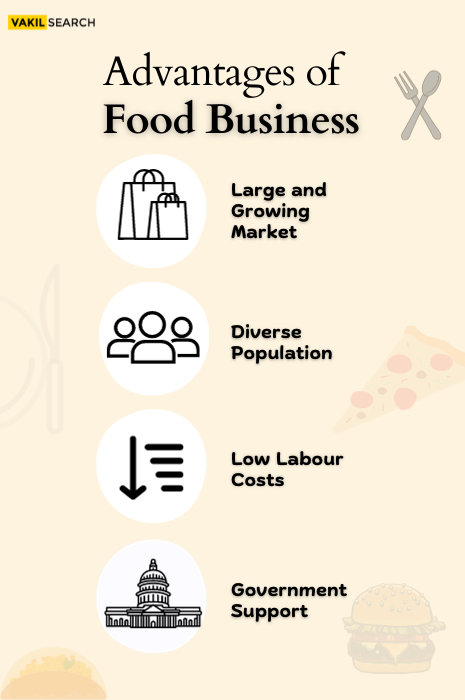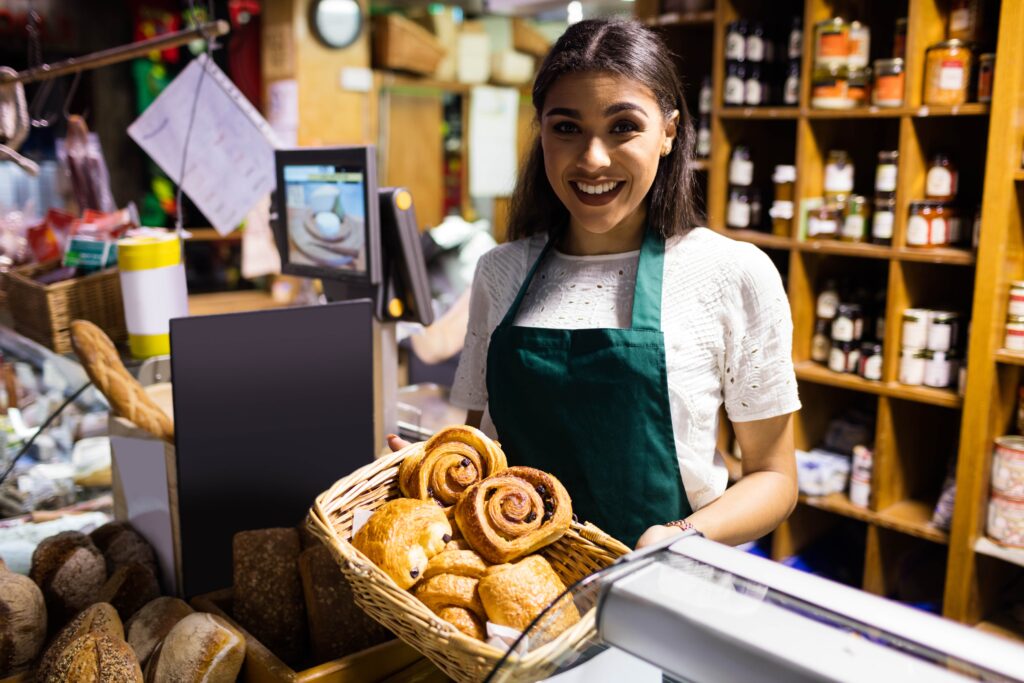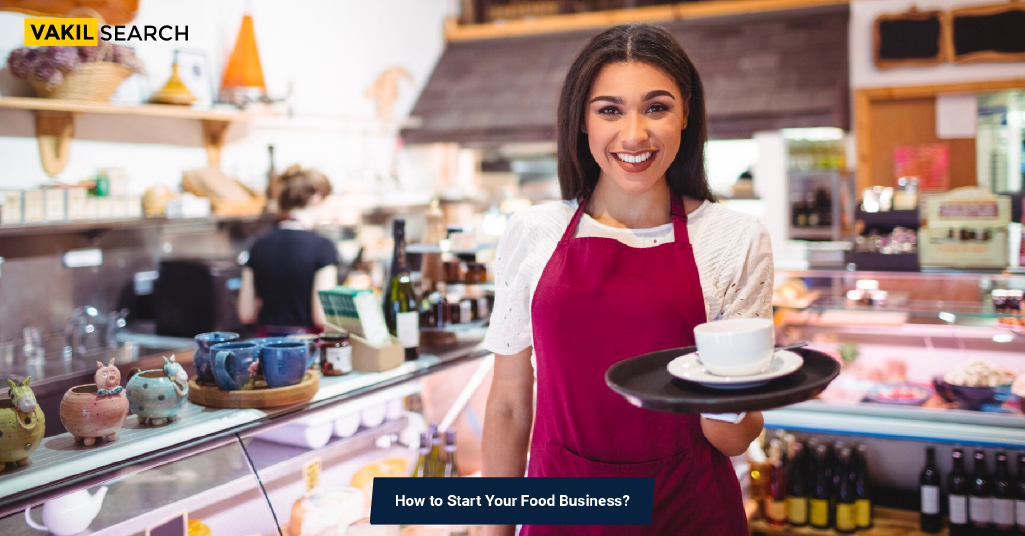Our step-by-step guide on How to Start Your Food Business covers everything you need to know from initial planning to the successful launch. Learn in detail now
Food Business in India
India has a large and growing food industry, with a market size of over $500 billion. The industry is expected to grow at a CAGR of 10% over the next five years. This is driven by a number of factors, including:
- A growing population with rising disposable incomes.
- A growing urbanization trend.
- Increasing demand for processed and packaged foods.
- A growing awareness of health and wellness.
Opportunities for Food business in India
There are a number of opportunities for starting a food business in India. Some of the most promising areas include:
- Health and wellness foods: There is a growing demand for healthy and nutritious foods in India as people become more aware of the importance of eating well.
- Convenience foods: As more people are leading busy lifestyles, there is a growing demand for convenient food options.
- Ethnic foods: India is a diverse country with a rich culinary heritage. There is a growing demand for ethnic foods from different regions of India and from other countries.
- Food delivery: The food delivery market is growing rapidly in India as more and more people are using online and mobile platforms to order food.
Documents Required to start a food business in India
The following documents are required to start a food business in India:
- Food Safety and Standards Authority of India (FSSAI) license: This license is required for all food businesses in India.
- Business registration: The business can be registered as a sole proprietorship, partnership, or company.
- GST registration: If the business’s annual turnover is more than ₹20 lakh, then it is required to register for GST.
- Other licenses and permits: Depending on the type of food business, the business may also require other licenses and permits, such as a fire safety license, a health trade license, and a pollution control license.
Advantages of Food Business

There are a number of advantages to starting a food business in India. Some of the key advantages include:
- Large and growing market: India has a large and growing food market, with a population of over 1.3 billion people.
- Diverse population: India is a diverse country with a rich culinary heritage. This provides a wide range of opportunities for food businesses to cater to different taste buds.
- Low labour costs: Labor costs in India are relatively low, which can give food businesses a competitive advantage.
- Government support: The Indian government is supportive of the food industry and has introduced a number of schemes and initiatives to promote its growth.
Food Business Ideas
There are a number of food business ideas that can be started in India. Some of the most popular ideas include:
- Food truck: Food trucks are a popular and affordable way to start a food business. They can be used to serve a variety of foods, from snacks and drinks to full meals.
- Ice cream shop: Ice cream shops are another popular food business idea in India. Ice cream is a popular dessert that is enjoyed by people of all ages.
- Cooking classes: Cooking classes are a great way to share your passion for food with others. You can start cooking classes for adults, children, or both.
- Personal chef: You can also work as a personal chef, providing cooking and meal-planning services to individuals and families.
- Coffee shops: Coffee shops are popular meeting places where people can enjoy coffee, tea, and other food and drinks.
- Meal kits: Meal kits are a convenient way for people to prepare healthy meals at home. You can start a business that delivers meal kits to customers’ doorsteps.
- Baked goods: You can start a business baking and selling cakes, cookies, pastries, and other baked goods.
- Sauces: You can start a business making and selling sauces, such as tomato sauce, ketchup, and barbecue sauce.
- Pre-packaged snacks: You can start a business making and selling pre-packaged snacks, such as chips, nuts, and cookies.
- Baby food: You can start a business making and selling baby food.
- Homemade jams and jellies: You can start a business making and selling homemade jams and jellies.
- Organic foods: You can start a business growing and selling organic foods.
- Wine, beer, and spirits: You can start a business producing and selling wine, beer, and spirits.

How to Start a Food Business?
-
Choose a product
What type of food do you want to sell? Choose a product that you are passionate about and that you have some knowledge and experience in. You should also consider the following factors:
- Demand: Is there a demand for your product? You can research this by looking at food trends, talking to potential customers, and conducting market research.
- Competition: How much competition is there for your product? You can research this by looking at other food businesses in your area and online.
- Profitability: Is your product profitable? You can calculate this by considering the cost of ingredients, labor, and other expenses. You can launch your business with confidence and Discover the simplicity of company registration in india!
-
Validate your idea
Once you have chosen a product, you need to validate your idea to make sure that there is a market for it. You can do this by:
- Talking to potential customers: Get feedback from potential customers on your product idea. What do they like about it? What would they improve?
- Testing your product: Sell small quantities of your product to potential customers to see how it sells.
- Creating a landing page: Create a landing page for your product and collect email addresses from potential customers. This will give you a list of people who are interested in your product and who you can market to when you launch.
-
Secure your financing
How much money do you need to start your food business? Once you have a good understanding of your startup costs, you can start to secure your financing. There are a number of ways to finance a food business, such as:
- Personal savings: If you have personal savings, you can use them to finance your business.
- Loans: You can get a loan from a bank or other financial institution.
- Investors: You can seek investment from angel investors or venture capital firms.
-
Develop a food business plan
A food business plan is a document that outlines your business goals and how you plan to achieve them. It should include the following sections:
- Executive summary: This is a one-page overview of your business plan. It should include your business concept, your target market, and your financial projections.
- Products and services: This section should describe the food products or services that you will offer.
- Market analysis: This section should describe your target market and the competitive landscape.
- Marketing plan: This section should describe how you will market your business and reach your target market.
- Financial projections: This section should include your sales forecasts, expense projections, and cash flow projections.
-
Choose your location
Where will you operate your food business? You need to choose a location that is convenient for your target customers and that has the necessary permits and zoning. You should also consider the cost of rent and other expenses when choosing a location.
-
Create your brand
Your brand is what will set your food business apart from the competition. It is important to develop a strong brand identity that is consistent across all of your marketing materials. Your brand should reflect the values and personality of your business.
-
Build your online store
In today’s digital world, it is important to have an online presence. You can create an online store to sell your food products or services directly to customers. You can also use your online store to collect email addresses from potential customers and to market your business.
-
Choose your suppliers
You need to choose suppliers who can provide you with high-quality ingredients and food products at a competitive price. It is also important to choose suppliers who are reliable and who can deliver your ingredients and food products on time.
-
Grow your audience
Once you complete pvt ltd company registration for food business, you need to start growing your audience. You can do this by:
- Marketing your business: Market your business online and offline to reach potential customers. You can use social media, email marketing, and paid advertising to market your business.
- Providing excellent customer service: Provide excellent customer service to keep your customers coming back. This includes being friendly, helpful, and responsive to customer needs.
- Offering loyalty programs: Reward your loyal customers with loyalty programs. This will encourage them to keep coming back to your business.
Starting a food business is not easy, but it can be a rewarding experience. By following these steps, you can increase your chances of success.
Food Business FAQs
Which food business is most profitable?
The profitability of a food business depends on various factors, including location, target audience, competition, and the quality of your products or services. Some profitable food business ideas include restaurants, food trucks, catering services, and specialty food products. Identifying a niche, conducting market research, and offering unique and high-quality food can contribute to profitability.
How do I start a simple food business?
Starting a simple food business involves several steps:
● Concept Development: Decide on the type of food business you want to start, such as a food stall, home-based bakery, or food delivery service.
● Business Plan: Create a business plan outlining your concept, target market, menu, pricing, and budget.
● Legal Requirements: Register your business, obtain necessary permits and licenses, and ensure compliance with food safety regulations.
● Location: Choose a suitable location if your business requires one.
● Menu Development: Design a menu with a focus on quality, taste, and cost-effectiveness.
● Sourcing: Find reliable suppliers for ingredients and equipment.
● Marketing: Promote your food business through online and offline marketing channels.
● Operations: Set up your kitchen or production area and implement efficient processes.
● Quality Control: Ensure consistent quality in your food products.
What is the easiest food to sell?
Easier-to-sell food items often include:
- Baked Goods: Items like cookies, cupcakes, and bread are popular and can be sold online or at local markets.
- Snacks: Items like popcorn, chips, and nuts have a broad appeal.
- Beverages: Selling beverages like freshly squeezed juices, smoothies, or specialty coffee can be relatively straightforward.
- Food Trucks: Offering a limited menu from a food truck can simplify operations.
- Ready-to-Eat Meals: Providing ready-to-eat meals or meal kits for busy consumers can be in demand.
How much does it cost to start a small food business?
The cost of starting a small food business can vary widely based on factors such as the type of business, location, scale, and equipment. Small food businesses may start with a few thousand rupees to several lakhs or more. Common expenses include permits and licenses, equipment, ingredients, marketing, and rent if you need a physical location.
What is the best food business to start?
The best food business to start depends on your interests, skills, market demand, and budget. Some popular food business ideas include:
- Restaurant or Cafe: Offering a variety of dishes.
- Food Truck: Providing mobile food services.
- Catering: Specializing in event catering.
- Bakery: Selling baked goods.
- Food Delivery: Offering food delivery services.
- Specialty Food Products: Producing and selling unique food items.
The key is to choose a business that aligns with your passion and meets the needs of your target market.
What's the bestselling food?
The best-selling food items can vary by region and market trends. However, some universally popular food items include:
- Pizza: A versatile and widely loved dish.
- Burgers: A classic fast-food favorite.
- Pasta: Offers numerous variations and appeals to a broad audience.
- Ice Cream: A popular dessert choice.
- Chicken: Versatile and used in various cuisines.
- Bread: A staple in many diets.
- Rice: A dietary staple in many cultures.
- Chocolate: A beloved treat worldwide.

